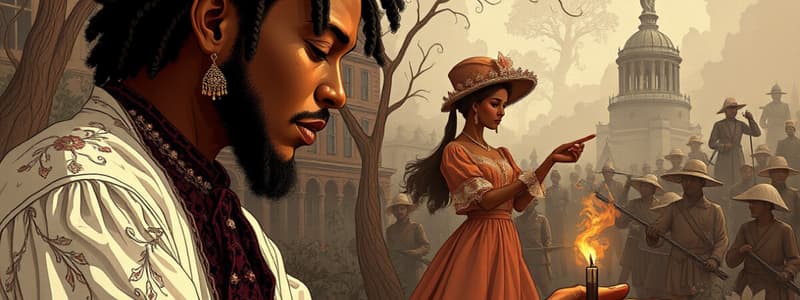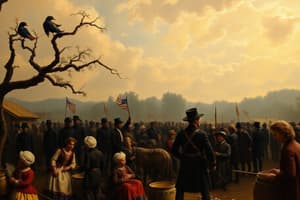Podcast
Questions and Answers
How did slavery cause the Civil War?
How did slavery cause the Civil War?
- Slavery was essential to the Southern agriculture economy (correct)
- The main cause was to end slavery (correct)
- The North went to war with the South to keep slavery
- Southerners needed to lie about slavery being the cause
How did the Southern plantation economy cause the Civil War?
How did the Southern plantation economy cause the Civil War?
- The North had no goods for trade
- The South had more black people than white people
- The cotton gin made by Eli Whitney increased cotton production (correct)
- European countries relied solely on Southern cotton (correct)
How did the abolitionists cause the Civil War?
How did the abolitionists cause the Civil War?
- They ignored the Constitution
- They wanted to end slavery in new states (correct)
- They helped colored people escape (correct)
- They fueled Southern resentment
How did Uncle Tom's Cabin cause the Civil War?
How did Uncle Tom's Cabin cause the Civil War?
How did the conflict between free states and slave states cause the Civil War?
How did the conflict between free states and slave states cause the Civil War?
How did the Kansas-Nebraska Act and Bleeding Kansas cause the Civil War?
How did the Kansas-Nebraska Act and Bleeding Kansas cause the Civil War?
How did the Fugitive Slave Laws cause the Civil War?
How did the Fugitive Slave Laws cause the Civil War?
How did the Underground Railroad cause the Civil War?
How did the Underground Railroad cause the Civil War?
How did the Dred Scott Decision cause the Civil War?
How did the Dred Scott Decision cause the Civil War?
How did John Brown cause the Civil War?
How did John Brown cause the Civil War?
How did secession cause the Civil War?
How did secession cause the Civil War?
Flashcards are hidden until you start studying
Study Notes
Causes of the Civil War
- Ending slavery was the primary motivating factor for the Civil War, with the North fighting to abolish it while the South aimed to preserve it.
- The Southern economy relied heavily on slavery for agricultural production, particularly in cotton cultivation, making it vital for their prosperity.
- Southern population: approximately 5 million white people and 4 million enslaved black people.
The Southern Plantation Economy
- Eli Whitney's invention of the cotton gin revolutionized cotton production, solidifying its importance to the Southern economy.
- The economic interdependence between Southern states and European markets did not prevent conflict.
Role of Abolitionists
- Abolitionists sought to eradicate slavery, particularly in new territories.
- They appealed to a "higher law" than the Constitution to advocate for immediate emancipation and equality for all.
Influence of Uncle Tom's Cabin
- Harriet Beecher Stowe’s novel depicted the harsh realities of slavery, fueling anti-slavery sentiments in the North.
- The book’s popularity amplified tensions between the North and South, leading to backlash from Southern leaders.
Free States vs. Slave States
- The status of new states as either free or slave intensified existing hostilities between the North and South.
- The North was primarily composed of free states, while the South was characterized by slave states.
Kansas-Nebraska Act and Bleeding Kansas
- Proposed by Senator Stephen A. Douglas, this act allowed settlers to determine the status of slavery, inciting anger among Northerners.
- The violence in Kansas, known as "Bleeding Kansas," epitomized the national conflict over slavery.
Fugitive Slave Laws
- Northern citizens faced fines for failing to assist in the return of escaped slaves, exacerbating sectional tensions.
- Many free blacks in the North were wrongfully captured as fugitive slaves, sparking outrage.
Impact of the Underground Railroad
- The Underground Railroad served as a secret network aiding enslaved individuals in escaping to freedom, primarily to Canada.
- Notable figures like Levi Coffin and Harriet Tubman played instrumental roles in helping enslaved people flee, angering Southern slaveholders.
Dred Scott Decision
- Dred Scott, a slave, attempted to sue for his freedom but was denied based on the ruling that he was not a citizen due to his race.
- The decision intensified the divide between the North and South, particularly as it involved a slave seeking freedom in a free state.
John Brown’s Actions
- Radical abolitionist John Brown led violent uprisings against pro-slavery forces in "Bleeding Kansas."
- His belief that armed resistance could end slavery contributed to the mounting tension leading to the Civil War.
Secession and Its Consequences
- Southerners opposed Abraham Lincoln's election as he was viewed as an opponent to slavery, prompting 11 states to secede and form the Confederacy.
- This division of states ultimately laid the groundwork for the Civil War.
Studying That Suits You
Use AI to generate personalized quizzes and flashcards to suit your learning preferences.


